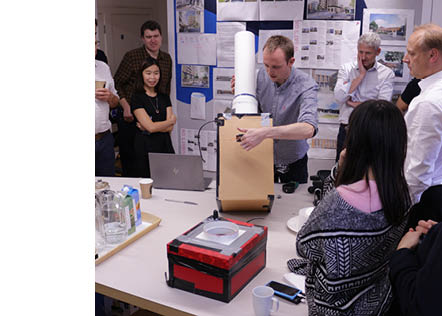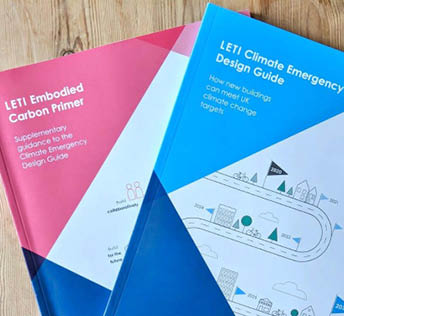A-Z of ArchitecturePLB, C=Climate Emergency
Date posted: May 22, 2020
The A-Z of ArchitecturePLB is a series of posts sharing some of our past projects, skills, and events, C=Climate Emergency.
A sustainable approach is central to our ethos and the practice has a long track record of inventive sustainable design solutions. We won The Independent ‘Green Building of the Year’ as far back as 1993, this commitment to low energy design continues in our current work.
Since signing ‘UK Architects Declare Climate and Biodiversity Emergency’ in 2019, ArchitecturePLB has been working to embed its commitments into our everyday practice. Director Rupert Cook and Senior Architect Wyn Gilley attended a full day of workshops in December, which focused on shifting from ‘business as usual’ and embracing regenerative practices to transform the industry away from its destructive paradigm.
We set up a sustainability working group to promote a sustainable approach for all our projects from inception to completion. This core team are working to enhance our in-house knowledge from the best ways to agree sustainability aspirations with our clients at briefing stage, right through to how to assess a building’s energy performance on completion. Below is a roundup of a few recent things we have been doing as practice.
To mark the week of the Global Climate Strike (20th – 27th September 2019), ArchitecturePLB stopped work for an afternoon to host a multi-disciplinary climate workshop. Participants on the day included council members and officers, landscape and sustainability consultants, local climate activists, project managers and contractors.We debated the issues and worked towards agreeing to some priority actions we can take as professionals within the construction industry. A write up of the event can be found here.
We followed up this event with a ‘Practice Day’ for the whole studio which focused on tackling the climate emergency. We invited Chris Swinburn, Building Services Engineer from QODA to talk to us about what we can do as Architects to make our buildings more sustainable and energy-efficient. After a sobering and informative talk, he set us an ‘airtightness challenge’ using cardboard boxes and a variety of tape. The day generated a lot of enthusiasm and a shared commitment to improving our energy targets.
We have become Passivhaus Trust members, completed five Passivhaus units for Eastleigh Borough Council, and are currently working with a number of clients to develop affordable housing schemes to Passivhaus standards. These include a small housing project for Winchester City Council which is targeting Passivhaus Plus and Net Zero Carbon. Associate Director, Paul Phasey, has also been talking to a number Local Authorities, Developers and Consultants about the challenge of Zero Carbon, and how a fabric led approach is essential.
Senior Architect Wyn Gilley has contributed to The London Energy Transformation Initiative (LETI)’s Climate Emergency Design Guide and Embodied Carbon Primer which sets out how new buildings can meet UK climate change targets. The Guides can be downloaded from LETI’s website: https://www.leti.london/cedg
We look forward to organising another Climate Emergency Workshop later in the year to review the progress we have made and maintain the focus on what we can we as as built environment professionals to respond to and tackle climate change.




